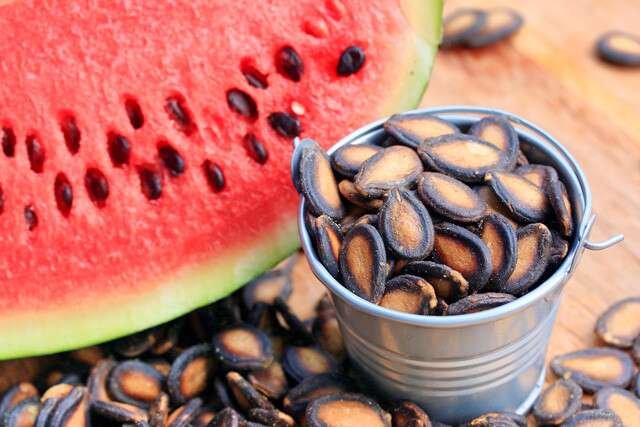[ad_1]

Watermelon seeds can provide beneficial nutrients, including magnesium and iron, and eating them roasted can be a healthful snack.
You might be accustomed to spitting them out as you eat — seed spitting contest, anyone? Some people just opt for seedless. But the nutritional value of watermelon seeds may convince you otherwise.
Watermelon seeds are low in calories and are nutrient dense. When roasted, they’re crispy and can easily take the place of other unhealthy snack options.
- Low calorie
One ounce of watermelon seed kernels contains approximately 158 calories. That’s not much lower than an ounce of Lay’s Potato Chips (160 calories), but let’s take a look at what constitutes an ounce.
A large handful of watermelon seeds weighs about 4 grams and contains about just 23 calories. Far less than a bag of potato chips!
- Magnesium
One of several minerals found in watermelon seeds is magnesium. In a 4-gram serving, you’ll get 21 mg of magnesium, which is 5 percent of the daily value.
The National Institutes of Health (NIH) recommends adults get 420 mg of this mineral daily. Magnesium is essential for many of the body’s metabolic functions. It’s also required to maintain nerve and muscle function, as well as immune, heart, and bone health.
- Iron
A handful of watermelon seeds contains about 0.29 mg of iron, or about 1.6 percent of the daily value. It might not seem like much, but the NIH only recommends adults get 18 mg in their day.
Iron is an important component of hemoglobin — carrying oxygen through the body. It also helps your body convert calories into energy.
However, watermelon seeds contain phytate, which decreases the absorption of iron and reduces their nutritional value.
- “Good” fats
Watermelon seeds also provide a good source of both monounsaturated and polyunsaturated fatty acids — one large handful (4 grams) provides 0.3 and 1.1 grams, respectively.
According to the American Heart Association, these fats are useful in protecting against heart attack and stroke, and lowering levels of “bad” cholesterol in the blood.
- Zinc
Watermelon seeds are also good source of zinc. They provide about 26 percent of the daily value in one ounce, or 4 percent DV in one large handful (4 grams).
Zinc is an important nutrient, essential to the immune system. It’s also necessary for:
the body’s digestive and nervous systems
cell regrowth and division
your senses of taste and smell
However, just like with iron, phytates reduce the absorption of zinc.
Source: www.healthline.com
[ad_2]
Source link



